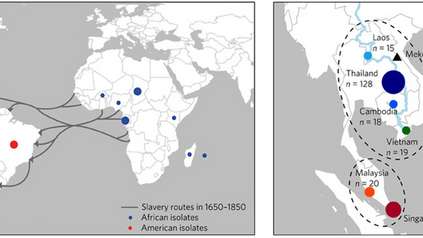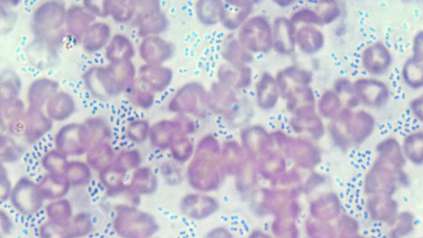Lives could be saved from tropical disease with new rapid test
Globally, more than half of patients die after infection with the neglected tropical disease, melioidosis, often before they are diagnosed1. A new rapid test could save lives by diagnosing patients in hours, rather than several days taken by current bacterial culture methods, meaning they receive the correct antibiotics faster.
The test uses CRISPR to detect a genetic target that is specific to Burkholderia pseudomallei, the bacterium that causes melioidosis, with 93 per cent sensitivity. It was developed by researchers at the Mahidol-Oxford Tropical Medicine Research Unit (MORU), Chiang Mai University, Vidyasirimedhi Institute of Science and Technology (VISTEC) in Thailand, and the Wellcome Sanger Institute in the UK
The results, published today (14 March) in Lancet Microbe, mean more lives could be saved from melioidosis, with a rapid, easy-to-use diagnostic test that could be rolled out globally.
Melioidosis is a neglected tropical disease that is estimated to affect 165,000 people worldwide each year, of whom 89,000 die from the disease1. It is caused by the bacterium, Burkholderia pseudomallei, which lives in soil and water in tropical and subtropical regions, and enters human bodies via inoculation through skin abrasions, ingestion or inhalation.
It is difficult to diagnose melioidosis as symptoms vary from localised abscess or pneumonia to acute septicaemia, or may present as a chronic infection. As a result of this, and the locations of isolated communities in rural areas that it mostly affects, the disease remains hugely underreported.
Currently, melioidosis is diagnosed in patients after bacterial samples are cultured, which takes three to four days. In Thailand, approximately 40 per cent of patients with melioidosis die2, many of whom die within the first one to two days following admission to hospital, while waiting for a diagnosis.
There is no licensed vaccine for melioidosis, but patients can be effectively treated with intravenous antibiotics – ceftazidime or carbapenem – during the first intensive phase of treatment. However, current practices often involve initially treating patients with a range of unnecessary antibiotics to target the various symptoms the disease produces, which can waste time and resources.
In a new study, the team set out to develop a new rapid test to reduce the time taken to correctly diagnose and treat patients with melioidosis.
The researchers identified a genetic target specific to B. pseudomallei by analysing over 3,000 B. pseudomalleigenomes, most of which were sequenced at the Sanger Institute. They searched for conserved regions of the genome and screened the targets against other pathogens and human host genomes, to ensure their chosen target was specific to B. pseudomallei.
Their test, called CRISPR-BP34, involves rupturing bacterial cells and using a recombinase polymerase amplification reaction to amplify the bacterial target DNA for increased sensitivity. Additionally, a CRISPR reaction is used to provide specificity, and a simple lateral flow ‘dipstick’ read-out is employed to confirm cases of melioidosis.
To assess the efficacy of the test, the team collected clinical samples from 114 patients with melioidosis and 216 patients without the disease at Sunpasitthiprasong Hospital, a hospital in northeast Thailand where melioidosis is endemic. The CRISPR-BP34 test was then applied to these samples.
The new test showed enhanced sensitivity at 93 per cent, compared to 66.7 per cent in bacterial culture methods. It also delivered results in less than four hours for urine, pus, and sputum samples, and within one day for blood samples. This is a significant improvement over the current bacterial culture diagnostic method, which typically takes three to four days.
This new rapid diagnostic test will enable health professionals to prescribe the correct antibiotics faster, meaning fewer patients will die while waiting for a diagnosis. While saving precious time, the new test will also save resources and money, with fewer unnecessary antibiotics prescribed and less time for patients in hospital.
In next steps for the team, they are currently designing randomised clinical trials to show the effectiveness of these tests in hospital settings. Plus, members of the team will begin investigating the role of human genetics in susceptibility and immune response to melioidosis infection.
“Working in rural Thailand has many limitations. But we have shown that limitations breed innovation, and what succeeds here can succeed anywhere. I am so proud of the team behind this new, robust rapid diagnostic test for melioidosis, and hope that it can potentially be used anywhere in the world to get the right treatments to patients faster, ultimately saving lives.”
Dr Claire Chewapreecha, co-lead author at the Mahidol-Oxford Tropical Medicine Research Unit (MORU), Thailand, and Wellcome Sanger Institute International Fellow
“We carefully designed the rapid diagnostic test based on CRISPR-BP34, with a robust algorithm, and tested its performance in vitro. We are thrilled that the CRISPR-BP34 test demonstrates outstanding diagnostic efficacy when tested on clinical samples, showcasing its potential to significantly impact patient outcomes and potentially save lives in the near future.”
Dr Somsakul Wongpalee, co-lead author at Chiang Mai University, Thailand
“This research is a testament to international collaboration and how the application of genomics at scale leads to clinical intervention. Using a genetic target mined from a bank of thousands of bacterial genomes, the team was able to produce an incredibly sensitive test that is specific to the bacterium behind melioidosis. I look forward to seeing the clinical impacts of this research.”
Professor Nick Thomson, senior author and Head of Parasites and Microbes at the Wellcome Sanger Institute
“Melioidosis has been neglected despite its high mortality rate and high incidence in many parts of Asia. Early diagnosis is essential so that the specific treatment required can be started as soon as possible. The new rapid diagnostic tool developed through this collaboration has the potential to be a game-changer.”
Professor Nick Day, senior author and Director of the Mahidol-Oxford Tropical Medicine Research Unit (MORU), Thailand, and the Wellcome Trust Thailand Asia and Africa Programme
More information
The research team would like to thank Sunpasitthiprasong Hospital in Ubon, where their clinical site was based, and VISTEC, who provided technical support. Without these collaborations, the project would not have been possible.
Publication:
S. Wongpalee, C Chewapreecha, et al. (2024) Benchmarking CRISPR-BP34 for point-of-care melioidosis detection in low-income and middle-income countries: a molecular diagnostics study. Lancet Microbe. DOI: 10.1016/S2666-5247(23)00378-6
Funding:
This research was funded by Wellcome and Chiang Mai University, Thailand.
International Fellowship Positions at the Wellcome Sanger Institute – applications open until 19 April 2024
The Wellcome Sanger Institute is seeking exceptional early career stage scientists to join the Institute as an International Fellow, contributing to the Institute’s scientific portfolio.
We have up to six fellowships available.
This fellowship brings the opportunity to access our unique research offering including:
- Industrial-scale data generation capabilities
- High-powered scientific computing infrastructure
- Extensive operational support
- Productive and motivated existing faculty
- Capabilities for global training and capacity development
- Existing global collaborative networks
- Partnership with Wellcome
We welcome candidates with research interests that complement one of our six research programmes. Our Aim is for International Fellows to bring in new areas and ideas that enrich our scientific research portfolio while also enabling access for the Fellows to our scientific community and central facilities within the field of genomic research.
Closing date for applications: 19 April 2024
Interviews will be held either week commencing 27 May or 3 June 2024
Find out more at: https://sanger.wd103.myworkdayjobs.com/en-US/WellcomeSangerInstitute/details/International-Fellowship_JR101743





